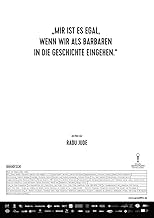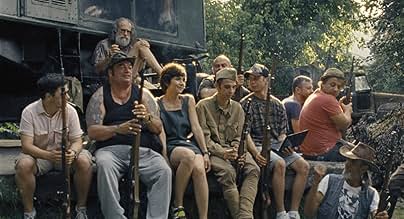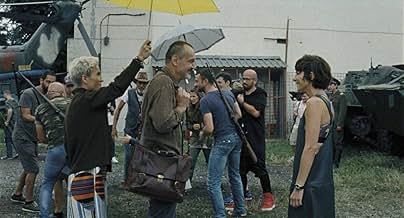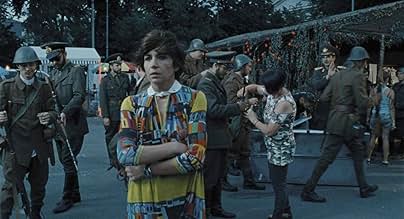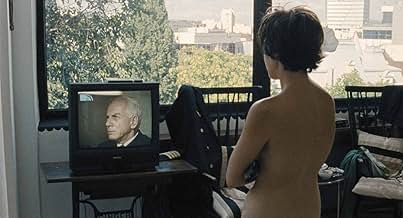Îmi este indiferent daca în istorie vom intra ca barbari
- 2018
- 2h 20min
CALIFICACIÓN DE IMDb
7.2/10
2.2 k
TU CALIFICACIÓN
"No me importa si la historia nos ve como bárbaros". Estas palabras fueron pronunciadas en el consejo de ministros de 1941, dando pie a que el ejercito rumano iniciase la limpieza étnica del... Leer todo"No me importa si la historia nos ve como bárbaros". Estas palabras fueron pronunciadas en el consejo de ministros de 1941, dando pie a que el ejercito rumano iniciase la limpieza étnica del frente oriental."No me importa si la historia nos ve como bárbaros". Estas palabras fueron pronunciadas en el consejo de ministros de 1941, dando pie a que el ejercito rumano iniciase la limpieza étnica del frente oriental.
- Dirección
- Guionista
- Elenco
- Premios
- 11 premios ganados y 18 nominaciones en total
- Dirección
- Guionista
- Todo el elenco y el equipo
- Producción, taquilla y más en IMDbPro
Opiniones destacadas
I wat lch a lot of movie from all countries and all genres, but this is the most boring piece of ... I ever saw. It shows an actress/ director doing research. She reeds a couple of minutes from a book, watches a youtubefilm, walks through a museum and lays naked in bed with her boyfriend. That was the first 45 minutes...
The photography was amaturistic and ugly, the discussions between the cast irritating and a mess.
Avoid, avoid, avoid!
The photography was amaturistic and ugly, the discussions between the cast irritating and a mess.
Avoid, avoid, avoid!
Radu Jude's "Îmi este indiferent daca în istorie vom intra ca barbari" ("I Do Not Care If We Go Down in History as Barbarians" in English) does two things at once. The most important is that it looks at a shameful instance in Romania's history: the army's massacre of Jews in Bessarabia, even before the Nazis arrived (one of the Nazi officials even complained that the Romanian army was simply going ahead and killing Jews!).
But the other issue addressed is how Romania has treated this in years since. Romania, like the rest of Europe, wants to simply think that it was a victim of the Nazis; in reality - as in most of Europe's other countries - plenty of its citizens were delighted to help the Nazis.
The protagonist is a woman making a movie about the 1941 Odessa Massacre carried out by the Romanian army, with the title referring to a quote from Foreign Minister Mihai Antonescu. During the movie's production, a number of people start revealing their unwillingness to acknowledge the country's history. As someone notes, it's comforting to be the good guy.
It's not a masterpiece, but it still calls into question how much anyone is willing to recognize the bad parts of their own country's history. As John Quincy Adams once said, the historian must have no country (and the one character does even note the US's sordid history).
But the other issue addressed is how Romania has treated this in years since. Romania, like the rest of Europe, wants to simply think that it was a victim of the Nazis; in reality - as in most of Europe's other countries - plenty of its citizens were delighted to help the Nazis.
The protagonist is a woman making a movie about the 1941 Odessa Massacre carried out by the Romanian army, with the title referring to a quote from Foreign Minister Mihai Antonescu. During the movie's production, a number of people start revealing their unwillingness to acknowledge the country's history. As someone notes, it's comforting to be the good guy.
It's not a masterpiece, but it still calls into question how much anyone is willing to recognize the bad parts of their own country's history. As John Quincy Adams once said, the historian must have no country (and the one character does even note the US's sordid history).
I have seen today together with other several hundred of spectators Radu Jude's most recent film, "I Do Not Care If We Go Down in History as Barbarians" at the Haifa Film Festival. A film that courageously and blutly addresses the theme of knowing and assuming the historical past in the Romanian society of today. A movie that will have an impact and will spark controversy, but I am convinced that this is exactly what the filmmakers intended.
Every people I know builds its own historical image, its own mythology. These are based in part on historical facts but viewed from their own perspective and beautified on a voluntary basis (to mobilize and unite 'nations' in times of crisis or for diversionist and propagandistic purposes) or involuntarily. Very few nations that I know have had and only at certain times of their history the lucidity of recognizing their mistakes, of contradicting their mythologies and of rectifying their own historical image to accept the mistakes and sometimes even the crimes committed by governments and the leaders they had chosen or accepted to represent them. Knowing and accepting your own history is a process that varies from country to country, from people to people, that is carried out differently and never easily. It is also the case of the Romanians and of Romania, who have experienced a series of successive dictatorships that for almost half a century have imposed alternate visions of their own history deformed by ideologies and nationalism, burring in silence the crimes committed during the Second World War, and especially the period of the Holocaust. The historical studies of the past 2-3 decades began to bring to light the dark aspects, but the process of knowledge and assumption is still difficult, it is struggling with ignorance and resistance. A few books such as those written by Catalin Mihuleac or films such as those of Radu Jude are part of this slow but essential process.
Many parallels can be drawn between director Radu Jude and the main heroine of the film, a stage director with a poet name who receives the financial support of the mayoralty for organizing a reconstruction of some episodes from Romania's participation in the Second World War. The show is planned to take place (symbolically I guess) in the center of Bucharest, in the Palace Square, the place where the (incomplete, hesitant) change of Romania's destiny began in 1989. Like Radu Jude himself, stage director Mariana takes the risk of including in her artistic creation not the accepted heroic nationalist official version of history, but the uncomfortable truths about the war crimes committed by the Romanian army in 1941, when it was allied with Nazi Germany. In the Romanian episode of the Holocaust, 380 000 Jews died, but these facts historically documented by studies and the work of the Wiesel Commission (which investigated Romania's part in the Holocaust) are still only partially acknowledged, accepted, assumed by most of the Romanian people from all classes of the society, from the political elite class to the majority of the population educated in the period of communist propaganda or that of the intellectual superficiality of the post-1990s. The idea that the Romanian governors and the army under their command were responsible for war crimes contradicts the mythology and idealized image created during long years of ignorance.
The Romanian society, as presented by Radu Jude, is fragmented on multiple plans. The director's historical and self-analytical approach enjoys the support of a part of the team with whom she works, but also encounters a great deal of resistance at all levels, from that of the cultural officials who attempt to influence the content of artistic creation in a "soft" version of censorship and up to some of the amateur actors and extras participating in the show, intrigued and indignant about the non-conformist version of the history that they are being directed to present. Racism and cabotinism, cynicism and demagogy lend themselves to a combination of sometimes comical, sometimes absurd attempts to divert the purpose of the project. Eventually something is done, but at a significant personal price.
Radu Jude's characters reflect other gaps and dissonances at different levels of today's Romanian society. Some of them are cultivated, they cite freely from philosophers and historians, but they also use at the same time vulgar street language, full of obscenities and curses. There is a secondary conflict of the relationship between the stage director and a married aviation pilot and the question of whether presenting it is essential to the main line of the film is legitimate. The answer is in my opinion positive, the character of Mariana is thus presented in its different dimensions, as a complex and yet familiar character, a smart and vulnerable woman in her personal life, far from being just a politically-obsessed individual. The acting performances are excellent, with special mention for Ioana Iacob in the lead role and Alexandru Dabija in the role of the cultural clark mediating between the artists and the authorities. The extracts from the archive materials of the cinematographic journals of the times are used intelligently under the pretext of documenting the realization of the reconstruction and create a clear picture of the historical context to which the film relates. The long frames and the use of hand-held camera create a dynamic and authentic atmosphere.
Is the movie too long with its two hours and twenty minutes? I confess that I was not bored at any moment, on the contrary, I was permanently interested in the subject and the details, and I found that the gradual construction of the action builds up in a final with a strong emotional impact. My only concern is that for audiences that are not that familiar with the history and present of Romania some nuances will be lost in translation, but maybe they will be the ones paying attention to different qualities and angles of interpretation.
For filmmakers and spectators, the central question of the movies seems to be whether history can be taught, rehearsed, assumed. The answer to this question remains ambiguous. "I Do Not Care If We Go Down in History as Barbarians" is a film that those who will see will not forget easily and will discuss for a long time.
Every people I know builds its own historical image, its own mythology. These are based in part on historical facts but viewed from their own perspective and beautified on a voluntary basis (to mobilize and unite 'nations' in times of crisis or for diversionist and propagandistic purposes) or involuntarily. Very few nations that I know have had and only at certain times of their history the lucidity of recognizing their mistakes, of contradicting their mythologies and of rectifying their own historical image to accept the mistakes and sometimes even the crimes committed by governments and the leaders they had chosen or accepted to represent them. Knowing and accepting your own history is a process that varies from country to country, from people to people, that is carried out differently and never easily. It is also the case of the Romanians and of Romania, who have experienced a series of successive dictatorships that for almost half a century have imposed alternate visions of their own history deformed by ideologies and nationalism, burring in silence the crimes committed during the Second World War, and especially the period of the Holocaust. The historical studies of the past 2-3 decades began to bring to light the dark aspects, but the process of knowledge and assumption is still difficult, it is struggling with ignorance and resistance. A few books such as those written by Catalin Mihuleac or films such as those of Radu Jude are part of this slow but essential process.
Many parallels can be drawn between director Radu Jude and the main heroine of the film, a stage director with a poet name who receives the financial support of the mayoralty for organizing a reconstruction of some episodes from Romania's participation in the Second World War. The show is planned to take place (symbolically I guess) in the center of Bucharest, in the Palace Square, the place where the (incomplete, hesitant) change of Romania's destiny began in 1989. Like Radu Jude himself, stage director Mariana takes the risk of including in her artistic creation not the accepted heroic nationalist official version of history, but the uncomfortable truths about the war crimes committed by the Romanian army in 1941, when it was allied with Nazi Germany. In the Romanian episode of the Holocaust, 380 000 Jews died, but these facts historically documented by studies and the work of the Wiesel Commission (which investigated Romania's part in the Holocaust) are still only partially acknowledged, accepted, assumed by most of the Romanian people from all classes of the society, from the political elite class to the majority of the population educated in the period of communist propaganda or that of the intellectual superficiality of the post-1990s. The idea that the Romanian governors and the army under their command were responsible for war crimes contradicts the mythology and idealized image created during long years of ignorance.
The Romanian society, as presented by Radu Jude, is fragmented on multiple plans. The director's historical and self-analytical approach enjoys the support of a part of the team with whom she works, but also encounters a great deal of resistance at all levels, from that of the cultural officials who attempt to influence the content of artistic creation in a "soft" version of censorship and up to some of the amateur actors and extras participating in the show, intrigued and indignant about the non-conformist version of the history that they are being directed to present. Racism and cabotinism, cynicism and demagogy lend themselves to a combination of sometimes comical, sometimes absurd attempts to divert the purpose of the project. Eventually something is done, but at a significant personal price.
Radu Jude's characters reflect other gaps and dissonances at different levels of today's Romanian society. Some of them are cultivated, they cite freely from philosophers and historians, but they also use at the same time vulgar street language, full of obscenities and curses. There is a secondary conflict of the relationship between the stage director and a married aviation pilot and the question of whether presenting it is essential to the main line of the film is legitimate. The answer is in my opinion positive, the character of Mariana is thus presented in its different dimensions, as a complex and yet familiar character, a smart and vulnerable woman in her personal life, far from being just a politically-obsessed individual. The acting performances are excellent, with special mention for Ioana Iacob in the lead role and Alexandru Dabija in the role of the cultural clark mediating between the artists and the authorities. The extracts from the archive materials of the cinematographic journals of the times are used intelligently under the pretext of documenting the realization of the reconstruction and create a clear picture of the historical context to which the film relates. The long frames and the use of hand-held camera create a dynamic and authentic atmosphere.
Is the movie too long with its two hours and twenty minutes? I confess that I was not bored at any moment, on the contrary, I was permanently interested in the subject and the details, and I found that the gradual construction of the action builds up in a final with a strong emotional impact. My only concern is that for audiences that are not that familiar with the history and present of Romania some nuances will be lost in translation, but maybe they will be the ones paying attention to different qualities and angles of interpretation.
For filmmakers and spectators, the central question of the movies seems to be whether history can be taught, rehearsed, assumed. The answer to this question remains ambiguous. "I Do Not Care If We Go Down in History as Barbarians" is a film that those who will see will not forget easily and will discuss for a long time.
This film is a great feat, with a universal message regarding the difficulty in facing our true national images in the mirror, including savage, murderous episodes. Exquisite acting and art, as well as nuanced irony neatly combined with grave philosophising and serious storytelling. I was glued to the screen for the entire 2 hours and 20 minutes.
An incredible movie about the difficulties of every nation to face its ghosts and to assume its history and eventually its identity.
¿Sabías que…?
- TriviaIn the film Molina (Alexandru Dabija) presses Mariana (Ioana Iacob) on why she is focusing Antonescu and not Communism, implying political bias. In response, she states that the next project can be about Communism. Radu Jude's next project, Uppercase Print, focused on repression and surveillance under Romania's Communist regime.
- ConexionesFeatured in The Story of Film: A New Generation (2021)
- Bandas sonorasMars Triumfal Si Primirea Steagului Si A Mariei Sale Printul Domnitor
Written by Eduard Hübsch
Performed by Orchestra Angely's
Selecciones populares
Inicia sesión para calificar y agrega a la lista de videos para obtener recomendaciones personalizadas
- How long is I Do Not Care If We Go Down in History as Barbarians?Con tecnología de Alexa
Detalles
- Fecha de lanzamiento
- Países de origen
- Sitios oficiales
- Idiomas
- También se conoce como
- I Do Not Care If We Go Down in History as Barbarians
- Locaciones de filmación
- Romanian Athenaeum, Bucarest, Rumanía(Exterior)
- Productoras
- Ver más créditos de la compañía en IMDbPro
Taquilla
- Total en EE. UU. y Canadá
- USD 11,307
- Fin de semana de estreno en EE. UU. y Canadá
- USD 2,083
- 21 jul 2019
- Total a nivel mundial
- USD 39,171
- Tiempo de ejecución2 horas 20 minutos
- Color
- Relación de aspecto
- 1.85 : 1
Contribuir a esta página
Sugiere una edición o agrega el contenido que falta

Principales brechas de datos
What is the Brazilian Portuguese language plot outline for Îmi este indiferent daca în istorie vom intra ca barbari (2018)?
Responda

